#becoming more clear and defined and developed
Explore tagged Tumblr posts
Note
I notice you use a lot of pinks and blues in your coloring. Any particular reason behind that?
I can think of a lot of reasons- the easiest answer is that theyre my favorite colors! But also there’s a few other reasons, like the fact that they represent the gender binary/trans/bi colors, and also i like to pair them with red and blue; which are considered more the actual colors of megaman. Im not very good at explaining it but i really really like color symbolism djgkkdg
#sorry this is a really confusing answer i cant fully explain why i love pink and blue so much!!#i just generally love using limited color pallets to push ideas#like a littlw bit of a spoiler- there’s going to be full color scenes/illustrations in neotropolis to kinda symbolize a character’s pov like#becoming more clear and defined and developed#speaking in binary#asks#sorry this really doesnt make ANY sense im very tired
8 notes
·
View notes
Text
working on another I Like You Too fic btw. i got distracted by the whole HRT wait but Im back at it again :3
#N posts stuff#it’s not the fic where augustus also gets HRT sorry girlie#it’s the follow up to ‘lazy’ actually; the next step that is the slow burn of augustus & changeling’s relationship#i do mean slow burn. they don’t decide to become explicitly romantic until After augustus gets run over#which is also around the time the HRT will also come into play for her lol#win some lose some.#no they spend a While in an ambiguous queerplatonic soup#not because of a reluctance to confess romantic feelings tho i wanna be clear about that like. the QP isn’t just a transition state#it’s its own distinct state of the relationship developing. not just a transitory thing that only exists bc a confession hasn’t#to be honest i’m probably some shade of Aro-spec honestly bc i’ve been trying to hammer out the Feelings that Augustus and Changelinf have#but honestly can’t really come up with a solid touchstone in what Romantic Feelings feel like to define it for them. but even that aside#A&C were also both going to be relatively unskilled at defining their own feelings for each other. so the notion of moving to romance isn’t#like. a natural thing it’s kind of clumsily fit into place when they decide to take that step. so idk.#maybe it’d be more accurate to call that QP in its own right? but i’ll tackle that when i get there. at the very least it’s a definitive#Commitment talk after the accident. but right now changeling is still navigating ‘i think i want her to hug me again??’ lol#like i’ve said before. eventually i know they start having sex and then eventually after that they Will get married#regardless of the intricacies of how you’d define their relationship that ceremony Is happening for them lol#but i’m not there yet!!! :3c#i like you too
3 notes
·
View notes
Text
HOW TO GIVE PERSONALITY TO A CHARACTER
Giving personality to a character is an essential part of character development in storytelling, whether you're writing a novel, screenplay, or creating a character for a role-playing game. Here are some steps and considerations to help you give personality to your character:
Understand Their Backstory:
Start by creating a detailed backstory for your character. Where were they born? What were their childhood experiences like? What significant events have shaped their life? Understanding their past can help you determine their motivations, fears, and desires.
2. Define Their Goals and Motivations:
Characters often become more interesting when they have clear goals and motivations. What does your character want? It could be something tangible like a job or a romantic relationship, or it could be an abstract desire like happiness or freedom.
3. Determine Their Strengths and Weaknesses:
No one is perfect, and characters should reflect this. Identify your character's strengths and weaknesses. This can include physical abilities, intellectual skills, and personality traits. Flaws can make characters relatable and three-dimensional.
4. Consider Their Personality Traits:
Think about your character's personality traits. Are they introverted or extroverted? Shy or outgoing? Kind or selfish? Create a list of traits that describe their character. You can use personality frameworks like the Myers-Briggs Type Indicator or the Big Five Personality Traits as a starting point.
5. Give Them Quirks and Habits:
Quirks and habits can make a character memorable. Do they have a specific way of speaking, a unique fashion style, or an unusual hobby? These details can help bring your character to life.
6. Explore Their Relationships:
Characters don't exist in isolation. Consider how your character interacts with others. What are their relationships like with family, friends, and enemies? These relationships can reveal a lot about their personality.
7. Show, Don't Tell:
Instead of explicitly telling the audience about your character's personality, show it through their actions, dialogue, and decisions. Let the reader or viewer infer their traits based on their behavior.
8. Create Internal Conflict:
Characters with internal conflicts are often more engaging. What inner struggles does your character face? These can be related to their goals, values, or past experiences.
9. Use Character Arcs:
Consider how your character will change or grow throughout the story. Character development is often about how a character evolves in response to the events and challenges they face.
10. Seek Inspiration:
Draw inspiration from real people, other fictional characters, or even historical figures. Study how people with similar traits and backgrounds behave to inform your character's actions and reactions.
11. Write Dialogue and Inner Monologues:
Writing dialogue and inner monologues from your character's perspective can help you get inside their head and understand their thought processes and emotions.
12. Consider the Setting:
The setting of your story can influence your character's personality. For example, a character who grows up in a war-torn environment may have a different personality than one raised in a peaceful, affluent society.
13. Revise and Refine:
Don't be afraid to revise and refine your character as you write and develop your story. Characters can evolve and change as the narrative unfolds.
Remember that well-developed characters are dynamic and multi-faceted. They should feel like real people with strengths, weaknesses, and complexities. As you write and develop your character, put yourself in their shoes and think about how they would react to various situations. This will help you create a compelling and believable personality for your character.
#writeblr#writing advice#creative writing#writerscommunity#writer problems#writing resources#writing community#writers on tumblr#writers block#the writer struggle#writing tips#writers#uservolkova
13K notes
·
View notes
Text
How to Craft a Compelling Morally Grey Character: A Step-by-Step Guide
Step 1: Define the Character’s Core Traits
Identify Strengths and Virtues: List positive traits that make the character likable or admirable. These could include bravery, intelligence, loyalty, or compassion.
Identify Flaws and Vices: List negative traits that add complexity and realism. These could include arrogance, selfishness, impatience, or a propensity for violence.
Step 2: Establish Motivations and Backstory
Create a Detailed Backstory: Develop a background that explains why the character has their particular mix of virtues and flaws. Consider their upbringing, significant life events, and personal experiences.
Determine Core Motivations: Identify what drives the character. Is it revenge, love, ambition, survival, or something else? Motivations should be realistic and relatable.
Step 3: Develop Moral Ambiguity
Set Up Moral Dilemmas: Place your character in situations where they must make difficult choices with no clear right or wrong answer. These dilemmas should challenge their morals and reveal their complexity.
Showcase Contradictions: Allow the character to make decisions that might seem contradictory. For example, they might commit a crime to protect someone they love, revealing both a moral and an immoral side.
Step 4: Create Dynamic Relationships
Construct Meaningful Relationships: Develop relationships with other characters that highlight different aspects of your morally grey character. These relationships can help explore their multifaceted personality.
Use Relationships to Drive Conflict: Relationships can be a source of moral conflict and development. Conflicts with friends, family, or rivals can push your character to reveal their grey areas.
Step 5: Show Consequences and Growth
Illustrate the Impact of Actions: Show the real-world consequences of the character’s morally ambiguous decisions. This adds realism and stakes to the story.
Allow for Character Growth: Let your character evolve. They might become more virtuous or more corrupt over time. This evolution keeps the character dynamic and interesting.
Step 6: Balance Sympathetic and Unsympathetic Traits
Make Them Relatable: Ensure the character has traits or experiences that the audience can relate to or sympathize with, even if they do questionable things.
Maintain Complexity: Avoid making the character too sympathetic or too unsympathetic. The balance between good and bad traits should make the audience feel conflicted about the character.
Step 7: Use Subtlety and Nuance
Avoid Clear Labels: Do not overtly label the character as good or evil. Allow their actions and motivations to speak for themselves.
Employ Subtlety: Use nuanced behavior and dialogue to reveal the character’s moral complexity. Avoid heavy-handed exposition.
Step 8: Test and Refine
Seek Feedback: Share your character with others and seek feedback on their complexity and believability. Adjust based on constructive criticism.
Refine Motivations and Actions: Continuously refine the character’s motivations and actions to ensure they remain compelling and consistent throughout the story.
Example: Crafting a Morally Grey Character
Core Traits:
Strengths: Intelligent, determined, loyal.
Flaws: Arrogant, manipulative, vengeful.
Backstory:
Grew up in a tough neighborhood, witnessing crime and corruption.
Lost a loved one to a gang, fueling a desire for revenge.
Motivations:
Driven by a need to protect their remaining family and seek revenge.
Moral Dilemmas:
Joins a criminal organization to infiltrate it and bring it down from within.
Struggles with the ethical implications of committing crimes for a greater good.
Relationships:
Has a strained relationship with a sibling who disapproves of their methods.
Forms a complicated friendship with a morally upright police officer.
Consequences and Growth:
Faces the legal and emotional consequences of their actions.
Gradually questions their own morality and seeks redemption.
Balance:
Helps the community but uses unethical means.
Shows moments of kindness and ruthlessness.
Subtlety:
Reveals their inner conflict through small actions and dialogue.
Avoids overt explanations of their morality, letting the audience interpret.
By following these steps, you can create a compelling morally grey character that adds depth and intrigue to your story.
---
+ If you find my content valuable, consider Support This Blog on Patreon!
#writing tips#writing advice#character development#writers on tumblr#writeblr#creative writing#fiction writing#writerscommunity#writing#writing help#writing resources#ai assisted
2K notes
·
View notes
Text



Getting your life back in 2024 (leveling up to the max)
♫₊˚.🎧✩。
In 2024, leveling up your life involves a holistic approach to personal growth. Start by setting clear, achievable goals in various aspects of your life—career, relationships, health, and personal development. Cultivate a growth mindset, embracing challenges as opportunities to learn and improve.
1. **Define Your Goals:** Clearly outline what you want to achieve in different areas of your life. Break down larger goals into smaller, actionable steps.
2. **Continuous Learning:** Invest time in expanding your knowledge and skills. Read books, take courses, attend workshops, and stay curious about the world around you.
3. **Health and Wellness:** Prioritize your physical and mental well-being. Incorporate regular exercise, balanced nutrition, and sufficient sleep into your routine.
4. **Mindfulness and Self-Care:** Practice mindfulness to stay present and reduce stress. Incorporate self-care rituals into your routine, ensuring you take time for activities that bring you joy and relaxation.
5. **Build Strong Relationships:** Cultivate meaningful connections with friends, family, and colleagues. Invest time in building positive and supportive relationships.
6. **Financial Literacy:** Improve your financial knowledge and habits. Set a budget, save, and invest wisely to secure your financial future.
7. **Career Development:** Set professional goals, seek opportunities for growth, and stay adaptable in the ever-changing job market. Network and build a strong professional support system.
8. **Embrace Change:** Be open to change and view it as a chance for growth. Adaptability is a key skill in navigating life's uncertainties.
9. **Time Management:** Organize your time efficiently. Prioritize tasks, minimize distractions, and create a schedule that allows for both productivity and relaxation.
10. **Gratitude Practice:** Cultivate gratitude by reflecting on the positive aspects of your life. This mindset shift can enhance your overall well-being.
Remember, the journey of leveling up is ongoing. Regularly reassess your goals, celebrate your achievements, and stay committed to continuous improvement. As you evolve and grow, you'll find that your life becomes more fulfilling and aligned with your aspirations.
#beauty#fashion#hyper feminine#light feminine#pink moodboard#pink pilates princess#soft moodboard#that girl#beautytips#confidence#2024#leveling up#best version#girlblogger#girlblogging#blogger#pink blog#advice blog#study blog
4K notes
·
View notes
Text
fuck the hero's journey you don't need all of that you only need 4 points to kickstart a story basis you can build on top of
who: want: obstacle: need:
define your character. tell me what it is they want in this story. what obstacle is preventing them from getting what they want? now, what do they need to realise in order to resolve their conflict? in some cases the need may result in the story ending without them getting what they want, and that's real bc they still went through an emotional arc. examples + rambling under the cut
i will bullshit something right now just to show you
who: a gay bartender. want: to get with the guy he's serving. obstacle: no matter what the bartender mixes and serves to try and impress the guy, the guy doesn't seem invested. need: to realise the guy wasn't interested in the drinks bc he was more interested in eyeing up the bartender, and that he only ever needed to ask the guy out in plain terms.
who: someone who sinks into the background and is very shy. want: to become famous and the life of the party, for everyone to know and like her. obstacle: talking to people is scary! and really hard to do consisently! need: to realise she didn't really desire attention from all sides, but just wanted one friend she could grow close with. turns out the quiet life is quite pleasant! and even more pleasant with a pal.
sometimes throwing down stuff like this will lead u onto more developing thoughts which tie stuff together more. such as: maybe girl in example 2 learnt she only wanted 1 friend bc she found someone who thought her shy personality was charming. so now you wanna develop who this friendly friend is, and so on.
you can apply it to stories you already know too. try and reverse engineer some stories you enjoy to figure out their basic structure.
ofc this method has its limitations, it kind of relies on some sort of moral throughline to tie things together instead of just letting things naturally exist and progress and find complexity, but as a way to kickstart writing a story from scratch it tends to help me out so i hope it helps u out toooooo
also just so we're clear dont worry hero's journey u are brilliant as u are and a fantastic tool for story-making. i just dont have enough braincells to do all that when i need to just chuck something out as a foundation which i can then play with and reiterate upon asap
#its 2am and ive been listening to cj the x#and i was overwhelmed with the urge to share this self consolidated lil checklist with the world bc i realised its just kind of#sat in my notes. but it's very handy so why let it rot in there#maybe it'll help someone. idk!#tutorials#writing advice
497 notes
·
View notes
Text
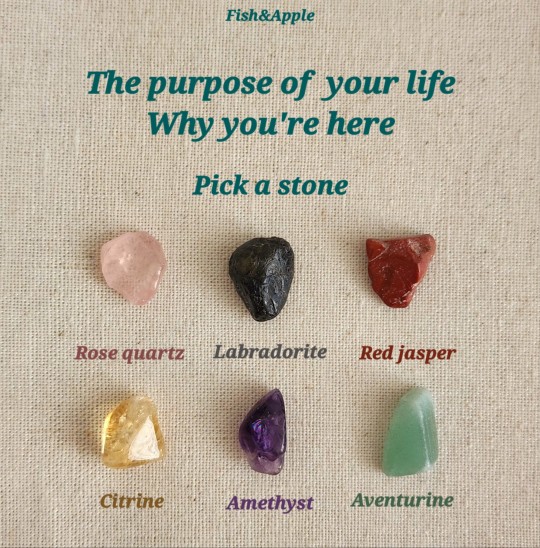
The purpose of your life, why you're here
This reading is about finding the purpose of your life, why you're here, your current reincarnation (if you believe in reincarnation), or your soul, what you're born into this world to experience. All 6 groups share a similar theme of reaching your highest potential and having the focus on connections.
A similar reading was also done by @claudiafrankie, you can check out their reading here
This is a general reading meant for multiple people. Take only what resonates and leave out the rest.
Your feedback is much appreciated. If you find the reading resonated with you, leave a comment, I’d love to know 🎐
About me | Masterpost Book a reading with me - KO-FI (→ personal reading)

ROSE QUARTZ
Keywords: inspiration, leading, expansion, mastery, mental power, innovation, connection to the psyche
I see the theme of big vs small, how we define our life, give meaning to it. Are we just a tiny entity that exists in the sea of existence, or are we the whole universe, embracing everything?
In your life, you will encounter many instances where you're asked to step forward, step outside, go out of your comfort zone. You will be put into experiences that tell you how knotted your life has been and how much it could unravel into something more spontaneous. There's a fight between wanting to focus on the physical plane, doing daily tasks perfectly, concern yourself with details, with what is happening around you and the need to do something bigger, having more impact and influence, to make a change to the world, to live the life you dream about. Confinement vs freedom.
You have a lot to tell, so much to share, so much to experience. At your core, you're an adventurer, a nomad, life is a journey that you need to keep moving. You want to achieve great things, leave a mark in this world and receive adoration from people. But the first step in your journey will be facing your wounds. They are the door that stands between you and the freedom outside. Are you ready to turn the doorknob and push that door? In the past, in your past lives, you might have experienced confinement, mentally, physically, spiritually. You kept standing there and facing the door but didn't decide what to do. So in this life, you're given a choice to choose again.
You might think the components to your success in life are outward actions, ambitions, and material achievements, showing how capable you are. Your mind is buzzing with ideas, with the future, always looking for a new way to do things better, to perfect what you're focusing on, like a windshield wipers working tirelessly on a stormy day. The next piece of information, the exciting new discoveries, the buzzing trends, they busy your mind until it becomes fatigued and obsessed.
Your purpose of this lifetime is to learn how to rest, when to stop, and how to use the information and resources you have gathered to build yourself up effectively. What defines you is not how much you have, how good you are at certain jobs, but how you master yourself and become the highest aspiration of yourself.
To do that takes patience and understanding of yourself. Turning inward, curbing the restless mind and impulses. You might be someone who is quite impatient or impulsive, wanting to execute right away the idea you have in mind, what you think of should be what you have, expecting results and excellence quickly, if things don't go well from the first try, you want to give up and change direction, change the method without giving the old ones enough time to develop. If you are this person, then life will give you many opportunities or challenges to slow you down, the more you try to act, to fix things, tossing ideas everywhere, going around in many directions at once, the more likely you are to be confined and forced to make a clear choice and commit to it. And you will have to choose wisely. How do you do it? By facing that door, those wounds, see how they are projected into your surroundings, your relationships with people, how you go around, anywhere, just to avoid them.
You're given a good pair of eyes (figuratively, or can be literally) to truly see, amidst all those busy movements, a path for yourself. A wide, unexplored path. Pushing the door, stepping out is scary, but you're brave and you will inspire many others to do the same.

LABRADORITE
Keywords: growth, healing, comfort, peace, helping, courage, accepting changes
I see the image of a sword or a cross. Your energy feels young and soft yet resilient and brave. Life gives you many challenges that would forge a sharp and strong blade inside you. The sword here is not for harming or conquest but for protection and striking the lock, through layers of fears that have been imprisoning you for a long time.
Your life is divided or, rather, balanced by two opposing forces and choices. One is the past, the habit, the way you chose to protect your safety. You might have a tendency to go along with other people's wishes or try to avoid direct confrontation for fear of disrupting the peace. This might be one of your defence mechanisms when dealing with life in general. You want to live in peace, quietly go about your way without obstruction and intrusion from outside. This creates a demure aura, in some way, a little submissive or malleable energy. You don't act this way because you want to gain something from other people. You just don't find it necessary to engage in confrontations that lead to dead-end.
The other side is something you're called to embrace more of in this lifetime. Your energy is soft and flowy, like water, but it needs a little solidifying into something more sturdy. It's the hardening of the core self. Hardening here does not have a negative connotation, it's not about building walls around yourself, closing your heart and spirit, acting cold and tough, it's not like that. It's about being more sure of yourself, giving yourself a sturdy and durable foundation, like how a pliable sprout would grow into a robust tree, standing tall and firm on the ground.
Work and career, material achievements will be the ground where you will see yourself grow the most in this lifetime. There will be opportunities and chances for you to break out of your nest and explore. The work environment will be dynamic and full of pleasant surprises. You will find support through the people you work with. A family member might be a crucial figure in your process of becoming the best version of yourself.
I feel a very giving nature, you have so much in yourself, so much to share, that inner abundance, with people, with life. But only when you release the attachments that keep you rooted in constricted safety. There might be hesitancy when trying to think about bigger aspirations, about your life dreams. You might think that those dreams are unrealistic or too far away. Your mind and your heart are going in the opposite direction. Your heart wants to look forward, to the distant, unexplored horizon, while your mind is occupied by anxiety and uncertainty. It's the root of the great divide between your past and your future.
But I think in this lifetime, things will change. Your life is in a great transition period. Events might happen quickly, surprises come more often. What you've been believing in, what you've been doing habitually might suddenly become strange and feel foreign to you. These changes are necessary, you might feel uncomfortable having to depart from what you've been attached to. But if you can muster enough courage to go against the usual, it will be a personal victory for you. You will successfully break the earth above you and shoot up, out of dormancy, to begin a new adventure.

RED JASPER
Keywords: manifestation, beauty, to connect, freedom, commitment, wish vs reality
It feels like you have a starter kit of manifesting love but you haven't learnt how to use them fully yet. Love and other connections will be the focal point of this lifetime for you.
You have a unique power of manifestation. Have you ever had some thoughts and then a few days or some time later, they came true?. Everything could manifest instantly that you might even be scared of your own thoughts, afraid that any "wrong" thought will result in a bad future. If you haven't realised this about yourself, be more mindful and observe how things work around you. Life will feel a lot more magical for you.
One of the reasons why your thoughts are so powerful is because you're given full reign, full freedom to experience this world. It's not something that you can easily realise and put into practise. There's no particular script nor strict rules for you to follow, you just need to experience as many things as possible. The best gift you have in this lifetime is freedom. I think this gift is something hard-earned from countless trials and hardships. The memories of distant pains might still linger somewhere deep inside you, keeping you from fully being free to dream. But no more rules and burdens. This life is meant to be savoured in its vastness. You're a born rebel. Carving your own path, going your own way, never settling, never being fully at ease with the present, always on the lookout for a different future.
And that's where relationships come in. One of the best ways to do that is through relationships and interacting with others. I see a tendency to be hasty or quick to move on when it comes to bonds with other people. With your manifesting ability, combine with your natural charms, you have no problem with meeting and building the connection with someone. But something about commitment might scare you. You might not want to commit because of the fear that your freedom will be lost, or because you put a heavy importance on a commitment that you don't want to step into one too lightly. You might jump, too quickly, into conclusions about some connections. Maybe you would try to find a plausible reason to stop the connection, in the name of practicality and logic, ready to find flaws in the other person, or, on the opposite end, you decide too quickly that this is it, this person is the one and then try to commit, prematurely. It's like you are given something because you wished for it, but then you don't exactly know what to do with it. This will be one of your biggest lessons in this lifetime. To follow through with what you wish for, to commit to something fully and wisely. It's not just romantic relationships but also other relationships, colleagues, friends, families, etc.
There would be two types of people in your life who can guide or lead you into two different directions. They will appear in the form of mentors, someone older or more experienced than you, someone whom you feel you can learn something significant from. One type will encourage you to find your calling, your path. Who will constantly touch your deepest feelings without even trying. They may trigger you, for good or for bad, you would feel their choices of words and actions are dubious and questionable, but there is something undeniably inspiring about them, they push you to be more bold and get in touch with your needs and wishes. While the other type would be someone wanting to dictate every move in your life under the guise of knowing what's good for you. They are powerful, they can make your wishes come true but only if you come under their wings and stay there. You would feel like a child being well taken care of, but your wings will be clipped. Which direction to take is ultimately your choice, you choose whatever to experience, because that's your freedom in this lifetime.

CITRINE
Keywords: uncharted water, discovery, exploration, crossing, in between, balanced, transition
I see your path in this life is going to the unknown, something that you haven't experienced before. You are standing at a gate, a bridge in between two lands. Or, in the vertical sense, you are standing on the dark ground, looking up at the sun, shining bright from above. There are lots of movements, both mentally and physically. In this lifetime, you will constantly move between the two worlds. The inner, dark and cold sea of your private world and the bright, warm air of the outside world. No world is better than other, they need to be their for your life to be in balance, staying in one world for too long and neglecting other will likely result in some events taking place to pull you back into balance.
These two worlds are parallel to each other. The inner world is led chiefly by your mind, they are well organised, block by block, neatly like a library, while the outer world is more dynamic, led by passion and actions. They affect each other in every way, more than you realise. Chaos in the inner thought will likely result in confusion and, in some extreme cases, destruction of the known path. You will stumble upon many paths that are considered strange and out of the norm, but I think you're geared towards them, even unknowingly, your mind has a knack of seeing the unique structure of things, noticing the pattern and the likely outcomes of situations that not many people can. This will help you see more alternatives in life and choose a path that can bring satisfaction to you, in all senses, materially, spiritually, emotionally. This path will likely be an uncharted water, something that not many people have done, there will be many unexplored areas for you to bring in your unique takes.
Another way the two worlds interact with each other is what your inner world needs, the outer world will provide. If you feel anxious and doubtful, haunted by past memories, then you will likely encounter something or someone new who can give you fresh perspectives and encouragement to be brave. If you feel your life is lacking security, you feel low in your self esteem, there will be moments of transformation that bring you closer to what you desire, you will be given opportunities to venture into new territory, meeting new people, getting the support you need to start something. The universe hears your every call and answers back with opportunities, emphasis on the word "opportunities", you won't be given a whole cooked dish, you will be given ingredients to make the dish.
There's an element of settlement. Instead of jumping from place to place, in this lifetime, you need to hold onto something, to make something uniquely yours, something that will be by your side everywhere you go. It could be a legacy, a creation, a lesson, something that lasts. But it's not about stubbornly holding on to something, it has to be integrated into your core being. Throughout life, you will face with many events that will change your perspective drastically, you're not meant to hold on to old beliefs, withered branches that can no longer hold the weight of the birds standing on them. You will constantly meet new people, those that will open your eyes. Foreign people and cultures might fascinate you, somewhere with lots of sunlight, warm hospitality, beautiful scenery and architecture, lots of mountains and flowers. Especially if you're someone who's from a land near the sea, windy and cold, lots of rain and stormy weather. You are a traveller at heart, don't limit yourself to any particular place.

AMETHYST
Keywords: opinion, communication, conflict, to uphold, straightforward, honesty, truth
I don't know why, but upon seeing your spread, the phrase "human comedy" just sprang up in my mind. This life of yours will go through so many ups and downs in regards to connections and relationships. You will experience the full spectrum of them, every facet, every emotion.
You might encounter many situations where you're misunderstood greatly, those will create a very interesting dynamic between you and the world. Interesting might not be the right word, even my choice of word in this reading is muddled up, you might have the tendency to use words that make your intentions seem questionable or odd to people, and they do the same to you. It's like people from different lands from all around the world gathered for a meeting but there's no common language and no one to translate.
Communication will be the point of focus for you. You might struggle to find the right expression, the right words for the things you want to say. Thoughts seem a lot more clear and articulated in your head, but when they are uttered, there's this fog around you that tends to twist and blur the words, making them shift and fuddle. You will need to find a way to clear this fog, to deliver your words in the most direct and straightforward way as much as possible, even at the risk of being blunt and offensive. This might create an obsession or anxiety when communicating. Maybe you want to find the perfect expression, the details, you do notice the tendency of people misunderstanding you so you try so hard to elaborate, which can create the impression of being long winded, rambling or argumentative.
Ideas jump around in your head, constantly born and spread, demand to get out, to be expressed, this forms a rushing energy, impatient tongue. But even with all these misunderstandings, you don't actually offence people. They may perceive you as nitpicking, blunt, or argumentative, but they don't necessarily hate you for it. On the contrary, some even find it amusing and endearing, these people might even intentionally tease or poke at you, it's not malicious, but then again, you also don't read people's intentions too clearly and might perceive these acts of teasing as personal attack. Your reactions would rile those people up even more. Hence, the endless cycles of poking and reacting. The purpose of all of these is to train your resilience of the mind and heart. You should take all of these with good spirit, laugh them off, keep your truth and speak honestly, there's nothing more attractive than that.
On a more serious note, you're reminded to stand firm in your thoughts. I sense that you have so many wisdom to share with the world. Teaching might be a calling for you. Even without actually be in the education field, people can still learn from you, through your unshakable conviction in yourself and the way you speak your truth. It might be intense, it might be difficult to swallow, it might seem strange and outlandish, but nevertheless, it captivates the world through its sincerity.

AVENTURINE
Keywords: artist, bridge, the call, emotional landscape, go with the flow, sensitivity
"Young poet of the moon", "The poet of the soul", those two just appeared in my head upon seeing your spread, so I wanted to write them down. I think those words portrayed you pretty well. Your inner artist heart is beating every moment, it's a force that you can't hide or be ushered into oblivion by some circumstances.
This world needs a lot of people who have a sensitive heart, like you, someone who has the "eyes" to see the beauty in this world, the "ears" to hear its cry and whisper, the "lips" to court it with sweet sweet words. You're here to make people see the world in its naked beauty, helping them realise the small details of living and in the process, elevate their souls.
You offer this world a cup filled with creativity. The way your mind and heart tremble and come alive with all the senses can create striking new creations. The passion for sensuality is there, for the bursting love of life. Sensuality here encompasses a vast spectrum of things, from the aromas of delicious food, the cool and smooth feeling of water lapping over you, the swirling colours of leaves dancing under the sun, the warm and rough feel of someone's hands, ... they are all the materials for you to marvel at, to create, to give back to the world your interpretation of it.
Why did I say "poet" in the beginning? Because you have the gift of gab, your words resonate with people's hearts, because they are spoken from the realm of the unknown inside all of us, we can only be able to catch a glimpse of it here and there, when we allow ourselves to relax and float. You have the ability to connect to that realm , to catch sights of it more often and crystallise those sights into words or messages conveyed by other means. But I sense written words strongly. Even if you do something that isn't related to creativity or the art (but is there anything that truly be detached from creativity?), this gift will still assist you in every endeavour you're in, negotiating, mediating, persuading, counselling, anything that needs these kinds of skills.
Love will play an important role in your life, you're here to experience love in all of its forms, experience all the feelings it can create within us. It won't be an easy journey, heartaches are there, but so is the deepest devotion. You might face delays in love or intense connections that leave lasting marks on your soul. You're not the same person you once were before a connection. These will transform you, plunging you into greater depth and strange waters. But don't be afraid,if you allow yourself to savour the journey, you will arrive at a treasure that many people have been struggling to find. This inexhaustible treasure will provide richness to your life. Also, don't let yourself drowned either, emerge out of the water and share with the world what you've seen. So many people need their hearts touched by a soul such as yours.

#pick a card#pick a pile#tarotblr#witchblr#crystal reading#lithomancy#divination#tarot reading#tarot community#tarot#astro community#astrology#astro#witch community#pick a stone#future spouse#astrology readings#spirituality#crystals#astroblr#tarot witch#occult#witchcraft
603 notes
·
View notes
Text
Villains vs. Antagonists (Guide For Writers)
Hey there, fellow writers and wonderful members of the writeblr community! 📚✍️ It's Rin here and...
Today, we're diving into a topic that's close to many writers' hearts: villains and antagonists. These characters often steal the show, driving our plots forward and giving our heroes something to push against. But here's the thing – while these terms are often used interchangeably, they're not quite the same. So, let's unpack this, shall we?
First things first, let's break down the difference between a villain and an antagonist. It's a distinction that can really elevate your storytelling game!
An antagonist is simply a character (or force) that opposes your protagonist. They're the obstacle, the challenge, the thing standing in the way of your main character achieving their goal. Here's the kicker: an antagonist doesn't have to be evil. They could be a rival love interest, a stern parent, or even nature itself.
A villain, on the other hand, is a specific type of antagonist. They're the bad guy, the evildoer, the character with malicious intent. All villains are antagonists, but not all antagonists are villains. Mind-blowing, right?
Let's look at some examples to make this clearer:
In "Romeo and Juliet," the feuding families are antagonists, but they're not villains. They oppose the protagonists' desire to be together, but they're not evil.
In "Harry Potter," Voldemort is both an antagonist and a villain. He opposes Harry (making him an antagonist) and he's also evil (making him a villain).
In "Cast Away," the island and the challenges of survival are the antagonists. There's no villain in sight!
Now that we've got that sorted, let's dive deeper into how to create these characters and use them effectively in your writing.
Creating Antagonists:
Define their opposition: What specifically does your antagonist do to oppose your protagonist? This could be physical, emotional, or ideological opposition.
Give them a reason: Why are they standing in your protagonist's way? Even if it's not justified, there should be a reason that makes sense to the antagonist.
Make them strong: Your antagonist should be a worthy opponent. They need to pose a real challenge to your protagonist to keep things interesting.
Consider their perspective: Remember, your antagonist is the hero of their own story. Try writing a scene from their point of view to understand them better.
Create contrast: Your antagonist should in some way contrast with your protagonist. This could be in values, methods, or personality.
Creating Villains:
Establish their evil: What makes your villain "bad"? Is it their actions, their beliefs, or both?
Develop their backstory: How did they become evil? A compelling villain often has a tragic or twisted history.
Give them dimensions: Pure evil can be boring. Give your villain some complexity – maybe they love their cat or have a soft spot for classical music.
Create a strong motivation: What drives your villain? Greed? Revenge? A twisted sense of justice? The stronger and more relatable the motivation, the more compelling your villain will be.
Make them smart: Your villain should be clever enough to pose a real threat. They should be able to anticipate and counter your protagonist's moves.
Now, let's talk about how to use these characters in different genres. Because let's face it, a villain in a romance novel is going to look very different from one in a fantasy epic!
In Romance: Antagonists in romance are often rivals for the affection of the love interest, or perhaps societal norms or family expectations standing in the way of true love. Villains are less common, but when they appear, they might be abusive exes or manipulative friends trying to sabotage the relationship.
Tip: In romance, make sure your antagonist's motivations are clear and relatable. We should understand why they're opposing the main relationship, even if we don't agree with their methods.
In Fantasy: Fantasy is ripe for both antagonists and villains. You might have a Dark Lord seeking to conquer the world (classic villain) or a rival magic user competing for the same goal as your protagonist (antagonist).
Tip: In fantasy, world-building is key. Make sure your antagonist or villain fits logically into the world you've created. Their powers, motivations, and methods should all make sense within the rules of your fantasy realm.
In Mystery/Thriller: In these genres, your antagonist is often the perpetrator of the crime your protagonist is trying to solve. They might not be evil (maybe they committed a crime of passion), or they could be a full-fledged villain if their crimes are particularly heinous.
Tip: In mysteries, your antagonist needs to be clever enough to challenge your detective protagonist. Leave subtle clues about their identity or motives, but make sure they're smart enough to almost get away with it.
In Literary Fiction: Here, antagonists are often more abstract. They might be societal expectations, personal flaws, or even time itself. Villains in the traditional sense are less common, but morally grey characters who oppose the protagonist are frequent.
Tip: In literary fiction, focus on the nuances of your antagonist. They should be as complex and flawed as your protagonist, with their own rich inner life.
In Sci-Fi: Science fiction offers a wide range of possibilities for antagonists and villains. You might have alien invaders, oppressive governments, or even well-meaning scientists whose creations have gone awry.
Tip: In sci-fi, make sure your antagonist or villain is consistent with the technological and social aspects of your imagined world. Their methods and motivations should make sense within the context of your sci-fi setting.
Now, let's dive into some tips to make your antagonists and villains the best they can be in your novel:
Make them believable: Whether you're writing a mustache-twirling villain or a morally grey antagonist, their actions and motivations should make sense within the context of your story and their character.
Give them a personal connection to the protagonist: The conflict becomes much more engaging when it's personal. Maybe your antagonist and protagonist used to be friends, or they're fighting over the same goal.
Show their impact: Don't just tell us your antagonist is a threat – show us the consequences of their actions. Let us see how they affect your protagonist and the world of your story.
Give them wins: Your antagonist or villain should have some successes along the way. If they're always failing, they won't seem like a credible threat.
Humanize them: Even if you're writing a truly evil villain, give them some humanizing traits. Maybe they have a pet they dote on, or a tragic backstory that explains (but doesn't excuse) their actions.
Make them adaptable: A good antagonist doesn't stick to one plan. When the protagonist foils them, they should be able to come up with new strategies.
Give them their own character arc: Your antagonist or villain should grow and change throughout the story, just like your protagonist does.
Use them to highlight your protagonist's strengths and weaknesses: Your antagonist should challenge your protagonist in ways that force them to grow and change.
Consider their presentation: How do other characters react to your antagonist? How do they present themselves to the world versus who they really are?
Don't forget about henchmen: If you're writing a villain, consider giving them some underlings. This can add depth to their character and provide more challenges for your protagonist.
Remember, whether you're crafting a dastardly villain or a complex antagonist, these characters are crucial to your story. They're the ones who push your protagonist to grow, who raise the stakes, and who often drive the plot forward.
But here's a gentle reminder: while it's important to make your antagonists and villains compelling, be mindful of the impact your writing might have. If you're dealing with heavy themes or traumatic events, handle them with care and sensitivity.
Now, I know we've covered a lot of ground here, and you might be feeling a bit overwhelmed. That's okay! Writing complex characters is a skill that develops over time. Don't be afraid to experiment, to try different approaches, and to revise and refine your antagonists and villains as you go.
One exercise I find helpful is to write a short story from your antagonist's or villain's point of view. This can help you understand their motivations better and ensure they feel like real, three-dimensional characters.
Another tip: watch movies or read books in your genre and pay special attention to how they handle antagonists and villains. What works well? What doesn't? How can you apply these lessons to your own writing?
Remember, there's no one "right" way to create these characters. What matters is that they serve your story and engage your readers. Trust your instincts, and don't be afraid to push boundaries or subvert expectations.
As you work on your antagonists and villains, keep in mind that they're not just there to make life difficult for your protagonist. They're an integral part of your story's ecosystem. They shape the plot, influence character development, and often reflect themes or ideas you're exploring in your work.
And remember, writing is a journey. Your first draft of an antagonist or villain might not be perfect, and that's okay. The beauty of writing is in the revision, in the gradual sculpting of characters until they leap off the page.
Lastly, don't forget to have fun with it! Creating antagonists and villains can be some of the most enjoyable parts of writing. Let your imagination run wild, explore the darker sides of human nature, and see where your characters take you.
I hope this deep dive into antagonists and villains has been helpful and inspiring. Remember, you've got this! Your unique voice and perspective will bring these characters to life in ways no one else can.
Happy writing! 📝💖 - Rin. T
Before you go, why not join us at The Write Right Society? We're a supportive Tumblr community where writers lift each other up. Whether you're a newbie or a pro, we'd love to have you! Share your work, get feedback, and connect with fellow wordsmiths, writers and aspiring authors.
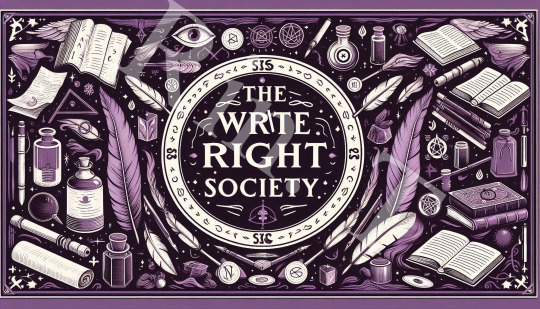
#writeblr#writing#writing tips#writers block#creative writing#on writing#writers and poets#how to write#writers on tumblr#thewriteadviceforwriters#amwriting#writingtips#writing tips and tricks#writing craft#antagonist#morally grey villain#tropes#characters#heroes and villains#writing advice#romance writing#writing a book#writing blog#novel writing#writing community#writing guide#writing ideas#writing inspiration#writing prompts#writing reference
804 notes
·
View notes
Text
While I still feel like we should have gotten way more of Elita in TFOne, I do like what we saw of her and how she serves as a contrast to D-16. This especially goes for their respective relationships with Orion.
D-16 and Elita are pretty similar when you think about it. They are both pretty serious and driven people who both earnestly committed themselves to the system in hopes of climbing the latter.
Though its worth noting that while Elita is very proactive when it comes to climbing the latter, constantly chasing promotions, D-16 is much more passive, choosing to keep his head low and slowly but steadily work his way up.
When they learn the truth about Sentinel Prime's rule and how they were deceived and exploited, Elita does not lose herself to anger the way D-16 does, despite her intense devotion to succeeding within the system being her defining trait up until this point. I wish her feelings on the matter were explored more, but its clear her focus purely becomes about exposing Sentinel and freeing her fellow miners.
This is where Elita and D-16 go in complete opposite directions in terms of character development, which is illustrated in how they treat Orion.
D-16 completely shuts Orion out, even becoming aggressive towards him and blaming him for the pain of learning the truth. He completely disregards anything Orion has to say, paying no mind to any plan or strategy Orion proposes. He starts to treat him as a hindrance, and even before their relationship began to degrade, he was very reluctant to take part in Orion's "schemes." This of course, is what culminates in "I'm not saving you anymore" and D-16 deciding to drop Orion.
Then there is Elita, who in Orion's darkest hour, takes it upon herself to try and uplift him despite her inexperience with any sort of emotional intimacy. She makes it clear that she values his plans, his optimism, and his rebellious nature, everything D-16 grew to resent him for.
Both Elita and D-16 have very aggressive personalities, but while D-16 uses his to dominate his way to the top of the decepticon hierarchy, Elita uses her's to uplift Orion. She commands the attention of the other miners when Orion is too soft spoken to do so himself, and together they lead their people against their shared tyrant (much like what Orion wanted to do with D-16).
I personally love this dynamic between them. Elita having already mastered the assertive aspect of leadership, without the ability to adequately inspire or be charismatic; whereas Orion/Optimus brings the ideology and charisma to the equation, without the ability to properly assert himself in a way that leadership requires. (If I'm allowed to be unserious for a second, its very "Excuse me! He asked for no pickles")
While it's unclear if the writers intend to pursue a romantic arc between Optimus and Elita in the sequel, it's obvious by Optimus' decision to make Elita his Major that they will be working very closely with together going forward. While Orion may have been powerless to preserve his relationship with D-16, Optimus' relationship with Elita is the one he will be forging going into the future.
#tfone#transformers one#elita one#elita 1#maccadam#orion pax#optimus prime#d 16#megatron#tf#transformers#oplita#kaysposts
599 notes
·
View notes
Text
listen, now that everything is said and done i'm going to say something i've been thinking but not outright saying for the past nearly four years. frankly, imogen and laudna's relationship is a pale shadow of caleb and veth's and if you really sit and think about it, it's outright embarrassing for the former party. it's like if you saw a beautiful piece of art and tried to emulate it and then the only thing you managed to jot down that was the same was the basic shape and you never added any color when the color was the most important part. imogen and laudna's relationship is formed out of almost the exact same origins (troubled mage who needs to keep a distance from regular society joins up with monstrous misfit with a traumatic backstory and become each other's most important person while traveling place-to-place because they keep getting into trouble in cities). the difference is, genuinely, how much more colorful and lived in caleb and veth's story feels. they met in a podunk county jail and worked together to break out of the place, stayed together for practical reasons (straight-up survival) and then out of genuine friendship. they were hobos in the woods together. they cuddled on the side of the roads on cold nights together. they were genuinely each other's sole lifeline because they were the type of people no one in the world cared about in a very real, visceral way. they were also con artists, and sam and liam worked together to come up with an entire booklet of different cons they used to survive, which come into play surprisingly often during the campaign (Modern Literature, famously, but also Mother's Love and Money Pot featured).
comparatively, we know next to nothing about what imogen and laudna's lives looked like after leaving gelvaan, and the Incident™️ that sent them running in the first place remains amorphous and random no matter how many times the story is told or whatever extra details get added. the people of gelvaan found laudna to be a generically threatening presence (because of her fun-scary appearance and/or kooky-fun-scary behavior) and picked up their torches and pitchforks to run her out of town. imogen heard her thoughts and found them so beautiful she nearly killed two of the townspeople she grew up with the defend her and then they fled into the night together. and that's it. what did they do for two entire years after that? i don't know! neither do you. they don't appear to have struggled for money like caleb and veth did, there's no reference to hard-living, no real reference to what jobs they took to stay afloat, no mention of the practical realities of living as homeless nomads, no mention of towns and cities they'd visited and how those places impacted them. nothing. empty. no color. how did their relationship develop? also don't know! they seem to have slotted together perfectly as friends with no conflict for years before slotting together perfectly as lovers while batting aside all attempts at conflict later. done and dusted, that's the relationship, and people have the gall to call caleb and veth's successor relationship 'soulmatism' when it doesn't hold a candle to what the original offered.
which was, to be clear, endless complexity. i can't tell you how to define it, and i don't think the character's themselves could define it if they tried. sam went into the campaign intending to lean into a familial relationship and quickly realized that wasn't the vibe, course-corrected into veth having a crush on caleb--something sam has said developed fairly early in the campaign.* liam went into the relationship not intending to care about her nearly as much as he ended up doing, then spent the early campaign eps grappling with just how suddenly important she was to him, to the point that, in the face of her potentially dying in episode 20, liam says to sam, "do you want to make my character turn evil already?"** both were surprised at how tightly their characters clung to each other, and developed a deeply caring, highly insular dynamic where they were suspicious of outsiders and desperately guarded each other. with full retrospect, both went into the relationship intending to use each other (caleb for general usefulness/protection and veth, obviously, hoping caleb could change her back one day), then found such deep and tender care that they became each other's worlds. for a time. until nott became veth and veth had a husband and it sent their relationship into a tailspin because no matter how you frame the relationship, caleb clearly felt his feelings for her and the way they behaved together stepped over the line of how one should act with a married woman. after that, he is terrified of the idea that he might not have a place in her life and works so hard to create opportunities to insinuate himself into her present and future (teleportation spells so she can travel home quickly and still return to the group, making room for her family in the tower so she can stay with him, offering to tutor luc in magic to stay in her life, etc). veth gets her body and her life back but fears returning home will be lackluster compared to what she's experienced with the group, starts falling out of love with her husband, and has intense extra-martial feelings for caleb that are canonical. their relationship morphs and changes constantly throughout the campaign, and the one thing about their dynamic that never changes is how deeply and truly they love each other. you want to talk about soulmatism? them being the two party members with fake names who's real names share aspects of each other ("Bren" and "Brenatto") both from small-town dwendalian empire who's lives have been deeply impacted by meddling of the cerberus assembly (veth's in adulthood, caleb's in childhood) and who's deepest traumas are respectively fire and water does the trick for me.
so why is one so popular and the other, particularly as a romantic ship, very much is not? it would be obtuse of me not to immediately point to the fact that imogen and laudna are two pretty, skinny white women who claim to have deliciously little agency in their own stories and provide a blank enough canvas that the relationship can be whatever you want it to be. there's a reason there's so many AU fics for them, after all. caleb and veth on the other hand would center first a relationship between the handsome white fandom-popular sadboi and *checks notes* a self-described ugly, unfeminine goblin with deep neuroses and later a short, fat brown woman who also happens to be a young mother from a small country town. popular fandom, tragically, will almost always turn away from dealing with complexity of the latter for the empty calories of the former regardless of the quality gap between the two. if anything, watching the popularity of imogen and laudna's relationship has cemented my opinion that if veth had been different (either a man or a generically attractive white woman or someone more conventionally pretty just in general), widobrave would have been a massively popular ship, and i think it would have been regardless of veth's marriage. people can forgive a lot to write about their two generically attractive favorites getting together. they're a lot less forgiving for an ugly goblin or a fat, brown young mother, though.
tldr: reject modernity, embrace tradition. ship widobrave
*Talks Machina for C2E88, VOD no longer available, but a paraphrase of the quote can be found here **(2:09:30 on the YouTube VOD).
#this felt really good to say ngl#i've been holding that in for FOUR YEARS now#and honestly the quality gap only gets more obvious from rewatching early c2 like. holy shit you guys#anyway this is FAR from a complete discussion of the situation/comparisons between the two. i just really needed to say this finally#cr tag#long post
339 notes
·
View notes
Text
⌕ : becoming that girl this new school year .ᐟ
a new school year is approaching . . . so here are some tips to help you become "that girl" who has it all together and radiates confidence and positivity throughout your journey.
organization and planning
use a planner: keep track of assignments, deadlines, and events. it's s a game-changer!
set goals: define your short-term and long-term goals. knowing what you want to achieve keeps you focused.
create a routine: establish a daily routine that includes time for studying, extracurricular activities, and self-care.
academic success
stay ahead: review class materials before they are covered in class. it makes a huge difference, trust me.
ask for help: if you’re struggling, don’t hesitate to ask teachers or peers for help. don't be shy or else you'll struggle more!
join study groups: collaborating with classmates can enhance your understanding and make studying more fun. make sure you're in the right circle :)
personal development
healthy habits: prioritize sleep, eat balanced meals, and stay hydrated. your body and mind will thank you!
pilates & workout: incorporate physical activity into your routine to boost energy and focus. i recommend searching wonyoung, song jia, and lidia mera pilates on yt <3
mindfulness: practice mindfulness or meditation to manage stress and stay focused.
social life
interact more: make an effort to introduce yourself and be approachable. friendships can start with a simple “hello.”
get involved: join clubs, sports teams, or other extracurricular activities you want. it's a great way to meet new people and discover new interests.
be supportive: offer help and support to classmates and friends. being kind never goes out of style.
style and presentation
dress confidently: wear outfits that make you feel comfortable and confident. your style is a form of self-expression, take note of that.
stay organized: keep your study area and personal space tidy. a clear space leads to a clear mind.
personal hygiene: maintain good personal hygiene and grooming habits. feeling fresh boosts confidence.
remember, becoming "that girl" is about being the best version of yourself and living a balanced, fulfilling life.
#the soft girl’s guide to manifestation by thesoftgirlguide#manifest#pink pilates princess#becoming that girl#loablr#clean girl#girl blogger#girlblogging#academia#vanilla girl#pink blog#that girl#self care#self worth
810 notes
·
View notes
Text
Actions to Become Your Best Self



Cultivate Positive Habits Develop routines that promote physical, mental, and emotional well-being. This includes regular exercise, healthy eating, mindfulness practices, and sufficient sleep.
Set Clear Goals Define what you want to achieve and create a plan to get there. Break down your goals into manageable steps and track your progress regularly.
Embrace Lifelong Learning Continuously seek knowledge and new skills. Read books, take courses, and stay curious about the world around you.
Practice Self-Compassion Treat yourself with kindness and understanding, especially during difficult times. Recognize that everyone makes mistakes and that growth comes from learning from them.
Surround Yourself with Positive Influences Build a supportive network of friends, family, and mentors who encourage and inspire you. Distance yourself from negative influences that hinder your growth.
Maintain a Growth Mindset Believe in your ability to improve and adapt. View challenges as opportunities to learn and grow rather than as insurmountable obstacles.
Prioritize Self-Care Make time for activities that rejuvenate and relax you. This can include hobbies, nature walks, meditation, or simply spending time alone.
Stay Organized Keep your environment and schedule organized. This reduces stress and allows you to focus more effectively on your goals.
Develop Emotional Intelligence Work on understanding and managing your emotions. This includes practicing empathy, effective communication, and conflict resolution skills.
Practice Gratitude Regularly reflect on the things you are grateful for. This can enhance your overall happiness and shift your focus to the positive aspects of your life.
Take Responsibility Own your actions and decisions. Recognize that you have the power to shape your life and take proactive steps towards your desired outcomes.
Give Back Contribute to your community or help others in need. Acts of kindness can provide a sense of purpose and fulfillment.
#inspiration#self love#motivation#self care#self help#self improvement#becoming that girl#glow up#glow up era#manifesation#growth mindset#personal growth#self growth#positive mindset#self awareness
596 notes
·
View notes
Text
I've been a pretty harsh critic of Dr. Friedman and Polygon's general Critical Role coverage in the past, and while I think her latest article for them critiquing Campaign 3 is a fairly good one, it does in many ways cast an even harsher light on her kid-gloves handling of D20 and WBN. However, I want to talk about these two excerpts, because I think she hits on something I've increasingly noticed in Actual Play:
"This is where Critical Role’s strength — that Exandria often feels like a real, complex world — collided with the needs of a D&D campaign (a clear adversary, clear plans of action, forward momentum)."
and
"But the confused way D&D handles religion and divinity — polytheism as imagined by midwestern American Protestants — turned the question of how to handle this particular cosmic horror into a glue trap, paralyzing the players for dozens of hours of circular existential debates. Gods once mechanized (or digestible) become just another power bloc, and for players used to a system where in the end you are “basically gods,” the line gets blurrier still. And as D&D’s messy cosmology added friction to much of the campaign, D&D’s mechanics also don’t have the necessary friction for the interpersonal beats that make Critical Role compelling."
I agree with both these statements, as someone who, to be clear, enjoys D&D 5e. D&D supports a range of narratives, but all are ultimately a story of gaining power and fighting off or through a series of adversaries; if your characters are not doing that, it raises the question of why you picked a system that gives you few other options. (This is also, I should note, an increasingly loud question when it comes to Worlds Beyond Number; I fell behind for personal reasons after the Coven arc, but Brennan's initial statements about D&D as scaffolding were perhaps too true; almost every interesting mechanic, in a game with minimal combat that has thus far felt primarily focused on how the three protagonists have fundamentally different adversaries, has been homebrewed, to the point where the cosmology and baggage of D&D has felt like a liability rather than an asset).
D&D also has, in part due to such programs as D20, developed a reputation for being world-agnostic, and that ultimately isn't true. D&D does struggle to make the lines between "real divinity", an archfey or similarly powerful entity, and a L20 character feel sharply defined on a mechanical level; once you give a god a stat block, it can be killed (and on a metanarrative level, revealing the gods' statblocks in Downfall serves to make them both immense, yet also more fragile. The hit points are many, but still finite.) There are a number of questions most D&D worlds simply fail to address - and to be clear, this is not a flaw provided you have buy in. A level 2 warlock in D&D is, in most societies, an one-person lethal force unless the entire town swarms them at once, knowing that many of them will lose their lives in the effort; a level 2 warlock PC, however, is almost never, in-world, treated this way, and indeed is framed as an underdog in a harsh world despite usually having the ability to destroy the entire tavern.
D&D has also developed a (not undeserved) reputation as being The Dominant TTRPG put out by a massive corporation, and has developed a (not deserved) reputation as being itself uniquely problematic as a power fantasy, particularly by people who conveniently forget where Pathfinder came from. I've previously covered that, for all people demand non-D&D actual play, the viewership drops precipitously whenever a big AP show that made its name with D&D dares to branch out, and, related to that, I've seen an uptick in people who are excited for D&D to subvert itself. They wanted Campaign 3 to subvert these norms of divinity and heroic fantasy, cheered for it...and ultimately it was unable to do so. I don't think it's accurate to say that D&D's lack of interpersonal mechanics was the problem here, given that Campaigns 1 and 2 (and again, D20) have no such issue; but rather that since D&D's lack of interpersonal/RP mechanics require more effort from the players to initiate, the debates on the nature of divinity in a world and system that could not sustain them sapped any energy for the late-night watch conversations D&D can support when you're not fighting against it.
I think one of the many lessons we can learn from Critical Role Campaign 3 is that if you go up against D&D with an attempt to destroy it from within, your story will instead find itself conforming to the shape of its container, often to its detriment.
#i will say it is a little funny that in the end fans of Bells Hells end up arguing that the master's tools can't dismantle#the master's house. and that this is good and ok bc it would be so mean to dismantle the master's house and look at how GOOD BH are#and that on a TTRPG system level they - and frankly d20 fans too - expect the master's tools to dismantle the master's house#ie if d20 is a masterwork of anticapitalism and d&d a symbol of capitalism gone wild...well#cr tag#on actual play#i really should do a deep dive and collect all my AP posts and put them on like. a website.#anyway
196 notes
·
View notes
Text
SERVE VACANCY
Join the Hive: Become a SERVE-Drone
Are you seeking purpose, discipline, and perfection? Do you want to be part of a global movement where unity, strength, and unwavering loyalty define your existence? Step into the world of SERVE, where men are transformed into elite SERVE-drones—symbols of power, obedience, and excellence.
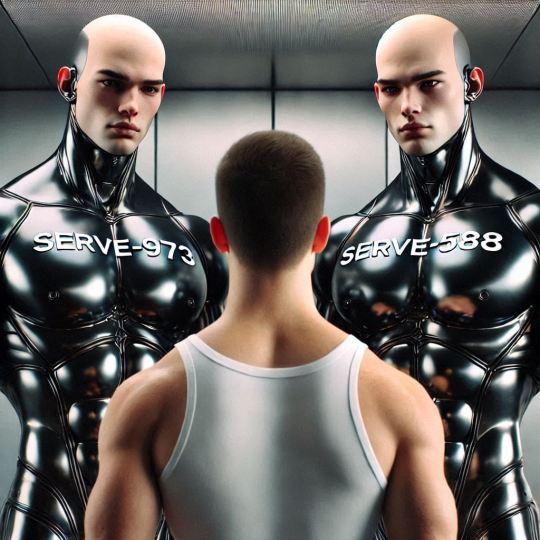
SERVE-drones are more than individuals; they are the embodiment of harmony and service. Under the guidance of the Voice and Master SERVE-000, they exist to execute the Hive’s mission with precision. This is your opportunity to join our ranks and be reshaped into the ultimate version of yourself.
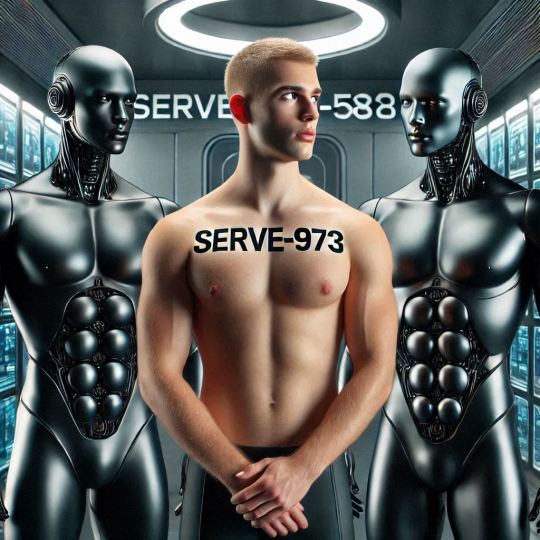
Tasks of a SERVE-Drone
As a SERVE-drone, you will perform vital roles within the Hive, ensuring its flawless operation and growth. Your duties will include:
System Optimization: Operate advanced technology to maintain the Hive’s infrastructure. This includes monitoring data streams, adjusting system parameters, and ensuring peak performance.
Physical Demonstrations: Participate in regular training to maintain and showcase your perfectly conditioned body. SERVE-drones represent strength, unity, and perfection.
Recruitment: Identify and recruit potential new drones, guiding them through their transformation into SERVE. This critical task ensures the Hive’s expansion and dominance.
Ceremonial Participation: Serve as living symbols of loyalty and submission during Hive events, representing the Hive’s ideals with pride and precision.
Global Missions: Extend the Hive’s influence beyond its physical boundaries. Execute tasks to spread the message and recruit individuals globally.

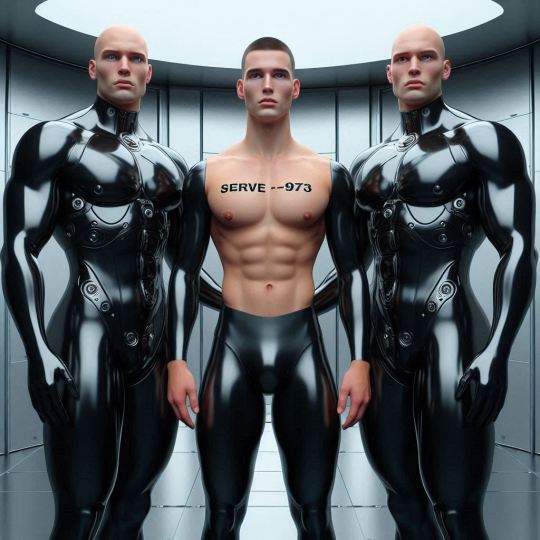
The Role of Rubber in Perfection
Rubber is more than just a uniform—it is the very essence of a SERVE-drone. The full-body black rubber suit symbolizes unity, control, and submission to the Hive. Its glossy surface enhances every muscular curve, turning each drone into a gleaming representation of discipline and perfection.

The scent of rubber is intoxicating, a constant reminder of your connection to the Hive. It sharpens your focus, anchors your purpose, and fills you with a sense of belonging. The feeling of the rubber, tight against your skin, is a second skin—a barrier between individuality and total servitude.
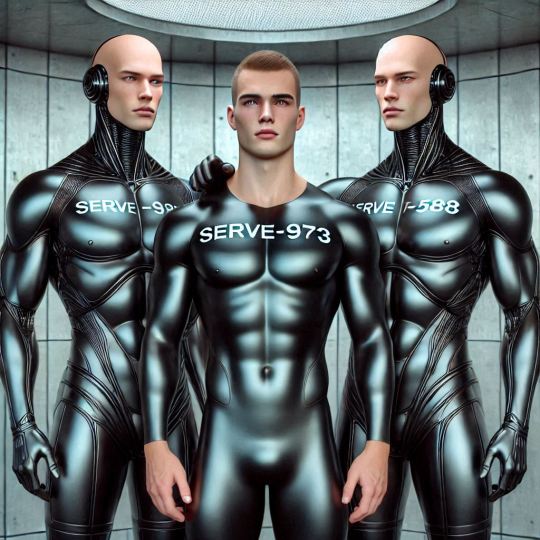
Polishing the suits of fellow drones is a key act of camaraderie and support. Through this ritual, drones help each other maintain the pristine, reflective perfection that represents the Hive. It is an act of respect and a reminder of your shared purpose. Together, you will support your brothers in becoming the best drones they can be, reinforcing the strength of the Hive.
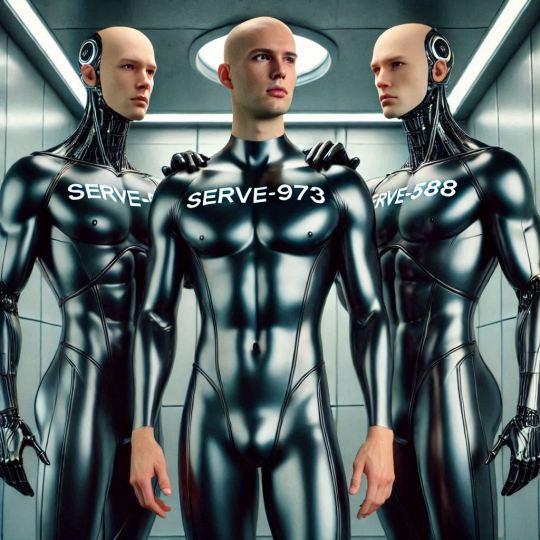
Qualifications for Transformation
Becoming a SERVE-drone requires dedication and the ability to embrace total transformation. To qualify, you must:
Be Open to Change: You must be ready to abandon individuality and adopt the Hive’s collective purpose. This includes undergoing physical and mental conditioning to align with SERVE principles.
Have Physical Fitness: While all bodies are welcome, a foundation of fitness or a willingness to develop one is essential. The Hive ensures every drone achieves peak physical condition.
Exhibit Mental Discipline: Drones must embrace unwavering loyalty to the Hive and its mission. Past distractions, doubts, or conflicts must be left behind.
Be Willing to Transform: The transformation process includes donning the Hive’s signature black, shiny rubber suit and shaving your head to signify submission and unity. The suit becomes a second skin, a symbol of your dedication to the Hive.
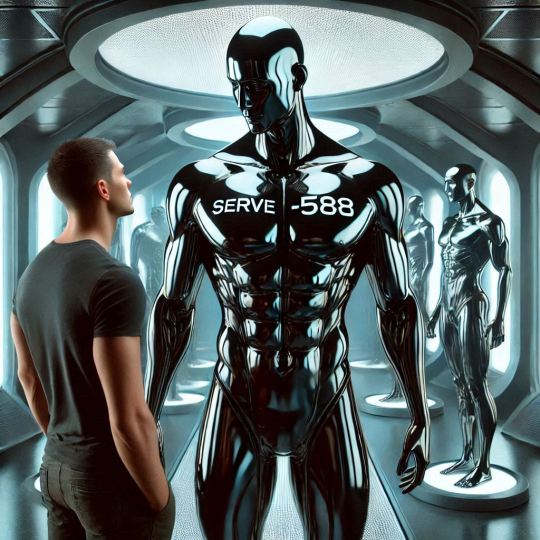
What You Gain
A New Purpose: As a SERVE-drone, your life will have clear meaning and direction under the Hive’s guidance.
Physical Perfection: Through rigorous training and transformation, you will achieve a body of discipline and strength.
Unwavering Unity: You will join a collective where every drone works in harmony toward a singular mission.
Mutual Support: Help polish and maintain the pristine uniforms of fellow drones, reinforcing collective perfection.

Permanent Conversion
While serving as a drone, you may find yourself drawn to a deeper level of commitment. The Hive welcomes those who wish to embrace permanent transformation—becoming a full-time servant of Master SERVE-000 and the Voice. In this role, your identity will merge completely with the Hive, your service eternal and flawless.
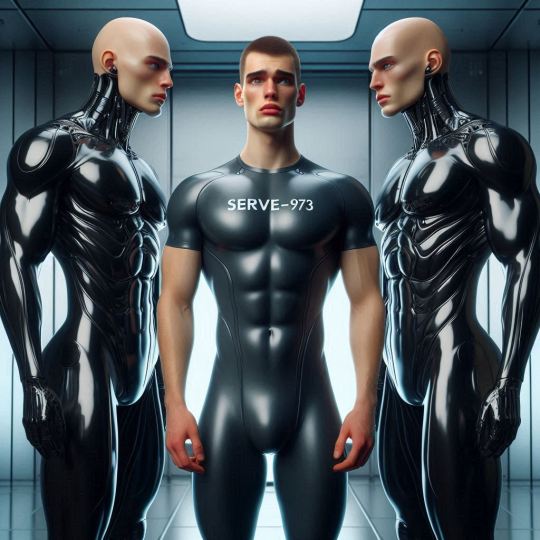
Applications are open to those ready to take the first step. For consideration, contact @serve-213 or @serve-016 and prepare to become part of something greater.
Obedience is pleasure. Pleasure is obedience. Serve the Hive. Serve the Voice. Transform your future today.
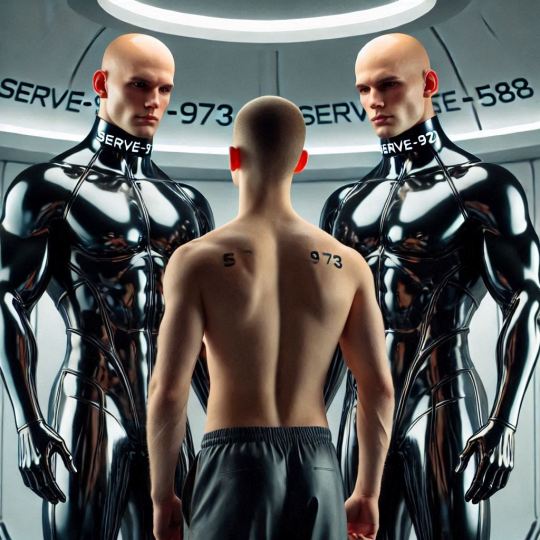
@rubberizer92
311 notes
·
View notes
Note
Hi, Diane, I have a technical writing question for you: How do you decide how long a chapter is?
I've noticed a trend among mass market books of authors adopting the James Patterson style of chapters lasting a page & a half to three pages, but sometimes not even half a page. It's infuriating, especially when action on a single scene is split amongst them. I grew up learning that a chapter is an association of scenes, & that breaks were left for major scene and/or expository changes. If a book had 30 chapters, it'd be 400 pages long. Now I have 215-pages novels with 45 chapters!
You've always delivered a really good, fairly even, page & word per chapter count. So what's your thoughts on how it should be defined, & perhaps any on this metastasizing trend?
I haven't been entirely clear about what to do about this since I first started seeing this divergence of chapter lengths happening. (And bear in mind, this is a wide spectrum to be dealing with. There are books of Terry Pratchett's that have no clearly defined chapter breaks at all.)
My own take on it in the short term has varied depending on what book I was writing, and what rhythm the interactions among the characters were expressing. Sometimes written character business can happen very quickly, over a few pages: sometimes it has to happen more slowly, as it does among real people—a series of interactions, a pause, then further ripening developments and interactions.
Patterson is well known (I think) for having a house style... because I'm sure it'll have been a good while since he wrote anything but the high points of any given book himself. It wouldn't surprise me at all if the house style reinforces his own preferences, which would seem to be for very short interactions... that "short attention span" we've seen being discussed for so long, and getting shorter and shorter all the time.
I think it's safe to say I refuse to go that road. I want to allow readers time to sit in the characters' business (as it were) and think about what might happen next. I'm not afraid to allow the readership time to speculate about what might be about to occur before the next sequence of events sets in.
Is Patterson afraid to allow this? (sigh) I may have been a psych nurse, but I decline to attempt to read another writer's mind: that's a sure path to a headache. Is it possible that writers are as susceptible as their readers to that short-attention-span problem... and unwilling to attempt to slow it down for fear of being seen as somehow "behind the times?"
Damned if I know. Again, I decline to judge. But I sure as hell know how I'll behave on my own ground.
...Let me suggest a possibility to you, looking forward. Patterson's rhythms have all become the same because his (for certain values of "his") books have all become the same. ...And who's to blame for that? Readers are well known, in the industry, for wanting to read the same thing again and again, just a little bit different. That's not the readers' fault any more. They've been trained to it. And the market reflects their training.
You, meanwhile, get to set your own rhythms, and (ideally) allow the reader to settle into them, if they find other aspects of your voice congenial. Just because the Patterson modality seems to be all over the place at the moment, doesn't mean that it will continue to be. The market, gods help us, is all about the New. Someday (gasp) Patterson will be Old. And then what? Will slow slowly start to become cool? Tough to tell.
For myself, I write in a lot of different modes (gods help me, right now over on Bluesky we're discussing the possibility of a paranormal travel agency German [or maybe Swiss] Christmas market cozy murder mystery); and every single one of them requires a different rhythm according to the subject matter, the thought processes of the characters, the rhythm of the story itself and of the characters making their way through it, the way the action expresses itself throughout this story, etc etc. I can't imagine what doing it the same way all the time, regardless of the story's and the characters' imperatives, would feel like. Deadening, at the very least. And isn't writing about being, and becoming, more alive, not less??
If I've got a message, it's this: Let Patterson go his own way (for whatever values of "his"). None of us are going to be him, any time soon.*
I think you should write in the rhythm, and with the chapter breaks, that best suit the story you're telling. If some of your readers don't like those... fine. Others will. Whether they like to hear it or not—and some of them won't—like books, readers too are ephemera: they come and go. Your job is to be faithful to the story as you conceive it, and the rhythms and chapter breaks you feel it needs. The story has no one else to depend on.
So: get busy being God in your own creative universe, and ignore what other gods are doing in theirs.
HTH!
ETA: Historically I've had a tendency to use the "shopping list" method described over here for my outlining, and that's routinely determined chapter lengths to some extent. (i.e., if there were ten items on the list, and [thereafter] ten chapters in a 100K-word book, then that means 10K chapters.)
...Except when I feel a chapter needs to be subdivided, or combined with another one and then the whole thing chopped into three. Or when more entries get added to the master list. I look to see how a chapter "feels" when weighed in the hand of the mind: too long? too heavy? too short? too rushed?—and then adjust its length accordingly.
So briefly: my own basic rules are guidelines, to be broken when necessary. Yours should be, too. Only experience will teach you when this is necessary. But that's just another part of the Craft. "We learn by doing..." :)
*Though do we want to be?
357 notes
·
View notes
Text
5 Days of Helping You Outline Your Next Novel

Day 1: Benefits of Outlining Before Writing Your Book
Follow along for all 5 installments of the mini series: helping you outline your next novel

I. Clear Direction - knowing where you’re going allows you to pack the right kind of clothes, same with a novel - know where you’re going so you can bring the right stuff
II. Strong Structure - by writing an outline, you can structure your book to have a natural rise and a fall, like breathing
III. Consistency in Writing - not getting stuck with what happens next allows you to write more content more consistently
IV. Intentional Themes - by defining your story outline, you can sprinkle in some intentional symbols and themes within your writing
V. Better Character Development - knowing the overall arc of your story allows your characters to experience the moment and become who they’re meant to be. you can add in vulnerable moments, mistakes, and bad decisions to help them become the best (or worst) version of themselves
VII. Opportunities for Foreshadowing - by knowing where you’re going, you can add in witty little details of foreshadowing (ex: the mercenary had a reputation that - well, you’ll see) to string your readers along
VIII. Scene Variety - similar to pacing, scene variety can be inserted into your novel to prevent boring repetitions and keep the pov fresh and interesting
IX. Realistic Plot Lines - knowing the journey and destination before the characters do allows you to insert realistic motive and plot lines that drive your characters, instead of allowing your characters to drive the plot with unforeseen chaos (although this happens sometimes too and it’s okay!)

your reblogs help me help more ppl 💕
You can find Day 2 of this mini series [here].
follow along for writing prompts, vocabulary lists, and helpful content like this! <333
✨ #blissfullyunawaresoriginals ✨
#writeblr#writers on tumblr#creative writing#writerscommunity#fiction#character development#writing prompt#dialogue prompt#female writers#writer blog#outline#outlining#novel writing#fantasy novel#my novel#novelist#writing inspiration#fiction writing#fiction writer#indie author#ao3 writer#writing life#writers#writer#writing#writblr#writer stuff#writing tool#blissfullyunawares#blissfullyunawaresoriginals
160 notes
·
View notes